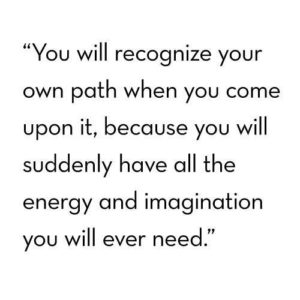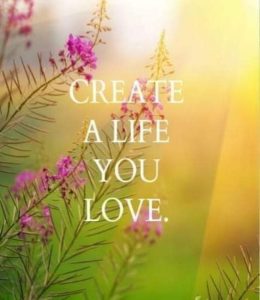
Why?
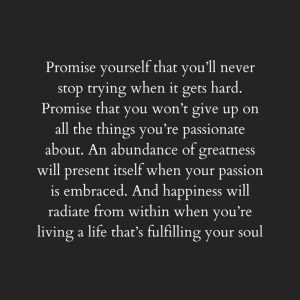

“Choose a job you love, and you will never have to work a day in your life.”
Confucius – Philosopher (551 – 479 BC)
An aim in life is the only fortune worth finding. – Jacqueline Kennedy Onassis
How?
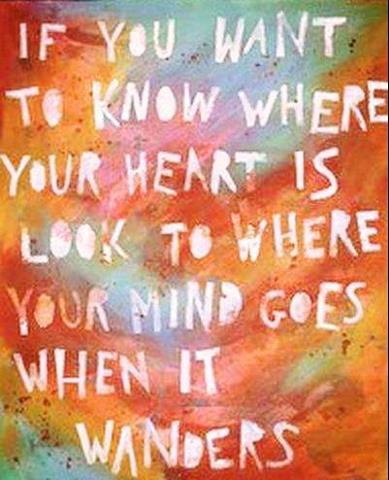
I attended a talk by Bernard Percy, a person who for a living (Foundations for Brilliance) helps people identify their basic purpose, and he spoke of talent, personality and basic purpose being a package. He drew three intersecting circles on the whiteboard and labelled one Talent, one Personality and the last one Basic Purpose.
He said that some people are doing something that suits their personality but it is not exactly on their basic purpose and not something at which they are never going to be the best in the world.
Others are doing something that is on their purpose but does not suit their talents or personality.
And others are in a career that they are really good at but does not totally fit their personality or basic purpose.
He then pointed to where the three circles intersected and specified THAT as the target: What we are after is this sweet spot in the middle, it’s on your basic purpose, you’re REALLY good at it and it fits your personality to a T.
I have found several ways to help people determine their basic purpose.
~~~~~~~~~~
One is to look over products they have gotten in the past to identify those of which they were really proud. Ones up there at the level of masterpiece. That evoke an emotional response.
Then I ask them if there was a purpose they had when they were doing that. It was always some specialization or narrowing of the purpose to help. To help people by/to _____________.
~~~~~~~~~~
Another is I get them to take a piece of paper, draw a line down the center and label the left column Personality and the right column Talent.
Then I get them to fill in their personality characteristics in the left column and everything they are good at in the right column bearing in mind talent relates not just to arts and sports but anything you find easy that others find difficult. The thing about which you often receive compliments: “Oh you’re so good at that!”
When I tried this first on my elder daughter, after she had completed the two columns I then asked, “Looking over the two columns, if Talent, Personality and Basic Purpose are a package, is there a purpose that weaves its way through those two lists?” She said, “Yes. To change kid’s lives. I want to make a difference in kid’s lives!”
So we packed her off to the Mohave Desert school for a year where she learned how to handle high dynamic kids with Joke Reader.
~~~~~~~~~~
A third technique is predicated on what I understand Confucius had to say on the subject, “Do something you love to do and you will never work a day in your life.”
I employed this technique on a young Chinese computer programmer who came to work for me as an intern straight after finishing his uni degree. I gave him a task to perform I would have expected a programmer to do in 15 minutes. Took him 2 days. I said, “Mate, you don’t appear to be cut out for this. How did you come to study computer programming?” Turns out it was not his choice at all, it was something his parents wanted him to do.
I figured we needed to get him on a track more aligned to his purpose.
I explained the concept of Be-Do-Have to him. To get a product (Have) you have to perform (Do) certain tasks which require you to assume a certain Beingness (Be). Each profession has a person assume a different Beingness, perform different Doingnesses to produce different products (Have).
I got him to duplicate that a Baker (Be) Bakes (Do or Does) and winds up with the product Bread (Have).
Most people ask kids, “What do you want to be when you grow up?” The better question is, “What do you want to do when you grow up?” The best question is, “What product would you most like to produce when you grow up?”
So I then told him to make a list of 50 jobs from an employment job seeking site and told him to work out what the product was of each job. I said after you do that, look at how much enjoyment you would get from producing each product. If you have no stomach for blood, cross out vet, nurse, doctor, surgeon etc. If you have a fear of heights, cross out abseiler, window cleaner, sky diver, airplane pilot, cell phone tower maintenance technician etc.
After you have crossed out those you would not enjoy you are left with a much shorter list. If, like me, you are 71 and don’t want to go back to school for 12 years to become an astrophysics professor, you could cross that off too. So you narrow the list down using any deselection factor you can till you are left with one or a few that you go, “YES! I would feel like I was being paid to have fun if I were doing that!”
He got the idea.
Two days later he was gone, found a job doing something FAR more suited to him than computer programming.
~~~~~~~~~~
This is such an import aspect of existence that one would be well advised to make is a high priority to spend whatever time it took to discover one’s basic purpose. Many wise men have felt the same. This one from Japan:
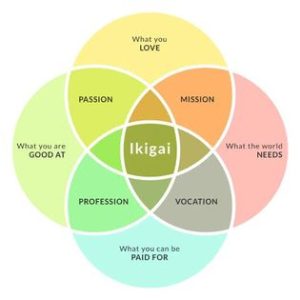
After I wrote this up it occurred to me that there was an omission in my write-up: the value of doing the exercise with another person who knows what to look for, can spot indicators and can apply decent two-way communication.
The other thing to do is then work out your product that best aligns with your purpose. For instance my primary purpose is to understand, my secondary purpose is to raise others to a higher level of awareness. My product is a more aware, more capable, more competent being, better abe to survive and help, able to help salvage this civilization or help build a new one out of the rubble of this one.
And I well remember some advice I received many years ago, “As you become more successful in business it becomes more important to say no. Opportunity is the enemy of small business. You do not have the resources to take advantage of all the opportunities that present themselves.”
IMHO this applies equally to a person as much as a business. As you gain more awareness and competence in life you see more that needs to be done and your interest comes up. So you can get very dispersed trying to do everything and make little headway with anything.
Imagine giving $1 each week to 50 different charities. More than a dollar’s worth of time would be wasted, your end and theirs, recording and receipting it. Better to give $200 once a month to one charity.
This can apply to projects too. Most tasks have a setup and cleanup time. so it may be more efficient to do 7 hours once a fortnight than 3.5 hours once a week let alone 30 minutes a day.
On the other hand it may not be possible to assign a block of 7 hours to one specific task, as any mother will tell you. It may be that spending 15 minutes a day, first thing after you rise, is the best way to ensure you make progress on the most important tasks in your life.
For I have read that often times the important things are not urgent and the urgent things are not important so one should make time to do the important things that make a difference as they are rarely the urgent ones!
My suggestion would be to schedule some time each week in the creative arts, even if it is as little as 2 hours and have a list of projects that you plan on doing but do one at a time. That way you can focus on completing a cycle of action, getting a product and you have a future mapped out. (Very good for survival having future goals.)
And once you know your path…
“Just don’t give up trying to do what you really want to do. Where there is love and inspiration, I don’t think you can go wrong.” – Ella Fitzgerald, Singer (1917 – 1996)
In closing, most people grossly overestimate what they can can get done in a day and grossly underestimate what they can do in a decade.
Hope this helps. If you get almost there and you need a hand to make it over the final jump, holler! I love to help. In fact, I am a serial helper.

